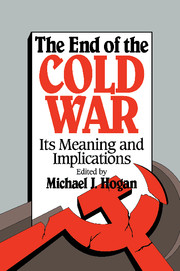Book contents
- Frontmatter
- Contents
- Preface
- The Authors
- Dedication
- 1 Introduction
- 2 An End to Which Cold War?
- 3 The Cold War, the Long Peace, and the Future
- 4 Quiet Cataclysm: Some Afterthoughts on World War III
- 5 Some Lessons from the Cold War
- 6 Nuclear Weapons and European Security during the Cold War
- 7 Victory in the Postwar Era: Despite the Cold War or Because of It?
- 8 The Wicked Witch of the West is Dead. Long Live the Wicked Witch of the East
- 9 The End and the Begining
- 10 A Balance Sheet: Lippmann, Kennan, and the Cold War
- 11 Why Did the Cold War Arise, and Why Did It End?
- 12 A View from Below
- 13 The End of the Cold War and the Middle East
- 14 The End of the Cold War in the Near East: What It Means for Historians and Policy Planners
- 15 After the Cold War: The United States, Germany, and European Security
- 16 The End of the Cold War: A Skeptical View
- 17 The End of the Cold War, the New Role for Europe, and the Decline of the United States
- 18 The Fading of the Cold War—and the Demystification of Twentieth-Century Issues
- 19 The U.S. Government, a Legacy of the Cold War
- 20 Foreign Policy, Partisan Politics, and the End of the Cold War
- 21 Beyond Bipolarity in Space and Time
- 22 A Usable Past for the Future
- Selective Bibliography
- Index
17 - The End of the Cold War, the New Role for Europe, and the Decline of the United States
Published online by Cambridge University Press: 18 December 2009
- Frontmatter
- Contents
- Preface
- The Authors
- Dedication
- 1 Introduction
- 2 An End to Which Cold War?
- 3 The Cold War, the Long Peace, and the Future
- 4 Quiet Cataclysm: Some Afterthoughts on World War III
- 5 Some Lessons from the Cold War
- 6 Nuclear Weapons and European Security during the Cold War
- 7 Victory in the Postwar Era: Despite the Cold War or Because of It?
- 8 The Wicked Witch of the West is Dead. Long Live the Wicked Witch of the East
- 9 The End and the Begining
- 10 A Balance Sheet: Lippmann, Kennan, and the Cold War
- 11 Why Did the Cold War Arise, and Why Did It End?
- 12 A View from Below
- 13 The End of the Cold War and the Middle East
- 14 The End of the Cold War in the Near East: What It Means for Historians and Policy Planners
- 15 After the Cold War: The United States, Germany, and European Security
- 16 The End of the Cold War: A Skeptical View
- 17 The End of the Cold War, the New Role for Europe, and the Decline of the United States
- 18 The Fading of the Cold War—and the Demystification of Twentieth-Century Issues
- 19 The U.S. Government, a Legacy of the Cold War
- 20 Foreign Policy, Partisan Politics, and the End of the Cold War
- 21 Beyond Bipolarity in Space and Time
- 22 A Usable Past for the Future
- Selective Bibliography
- Index
Summary
In this short piece I shall briefly address two rather large points. First, I shall discuss the question of whether, if the Cold War is over, this is likely to result in a more peaceful world. The role of Eastern Europe will be of particular interest in this context. Second, I shall comment on the effects the end of the Cold War will have on that apparently most burning of political questions, certainly in the United States but not only there: Will the United States remain Number One in the post-Cold War era? U.S.-(Western) European reations will be crucial here.
If the Cold War is defined as a very antagonistic relationship between two blocs, East and West, where the antagonism is at least in part based on irreconcilable ideological differences, then it is surely over. The basic change took place in the mid-1980s. In the course of a few years, Ronald Reagan went from denunciations of “the evil empire” to walking hand in hand with Mikhail Gorbachev in Red Square. The Soviet leader was pronounced the statesman not only of the year but also of the decade. The shift in American attitudes was only surpassed by that of the other side. Under the old system, Reagan had been described in the crudest of terms; under Gorbachev the Soviet caricature of the American president changed from “Rambo to Mister Rogers.” The euphoria is now gone, but so is the old antagonism. Second, with the Communist party and economic planning now discredited and democracy and the market rapidly advancing in the former Soviet Union, the ideological chasm has also been greatly reduced.
- Type
- Chapter
- Information
- The End of the Cold WarIts Meaning and Implications, pp. 195 - 206Publisher: Cambridge University PressPrint publication year: 1992
- 2
- Cited by



